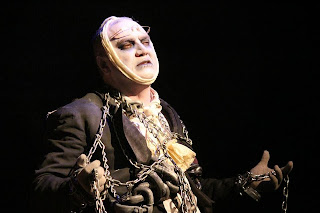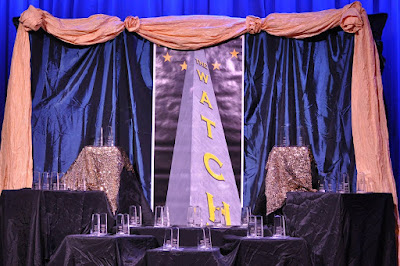The True Meaning of (A) Christmas (Carol – by Charles Dickens) - By cast member Elliot Bales
Every year
LTA produces a version of A Christmas
Carol based on Charles Dickens’ 1843 novella for our community. It will be
one of thousands of live performances of this classic to be performed
throughout the DC Metro area this holiday season. There will be musicals,
dances, puppet shows, even a phone-in version of this story produced in our
region and audiences will flock to them all. But why do “spirits walk the earth
and why do they come to” our stages year after year after year? Isn’t the story
of ole’ Ebenezer Scrooge dated and passé? Or is there some compelling, timeless
reason we are drawn to Tiny Tim’s jubilant “God bless us every one”?
First,
Scrooge has garnered a maligned reputation over the years. He has become
synonymous with meanness, perhaps even a little evil. In fact, Scrooge just
doesn’t care. He cares about and for no human being. He lives only with the
immediacy of the present moment, with no reflection on what went before or
thought for what comes next (cue ye olde ghosties). If he had an iPhone, he
would never look up from it, and his only communications would be with those
who wanted to borrow or needed to pay money. He remains disconnected from all
humanity, though his links to the information of the day delude him into
thinking he knows what transpires around him. His journey to redemption reminds
us that emotions and experiences will not be repressed forever, and are
difficult to compress into an hour-long story, much less 144 characters or the
average Facebook post.
Second, the
Ghost of Jacob Marley speaks a warning to all of us in our daily, urban and
suburban lives. He reminds us that our overwhelming focus on near term or
instant gratification will forever be unfulfilled (“not to know, that ages of
incessant labour…for this earth must pass into eternity before the good of
which it is susceptible is all developed”). He uncomfortably convicts us of our
head down, metro-riding, head-in-our-devices behaviors (“Why did I walk through
crowds of my fellow-beings with my eyes turned down, and never raise them to
that blessed Star which led the Wise Men to a poor abode!”). He cautions us
that delay in not using our good fortune and good will to reach out to friends,
family, and neighbors results in despair (“Not to know that no space of regret
can make amends for one life's opportunity misused!”). He preaches to us more
fervently than any minister, and thankfully, more briefly and efficiently.
Finally, the
message of redemption showers on us presents of hope and change. Dicken’s
personifies in his Ghosts our own innate ability to come to grips with our
past, to look up from our wired selves in order to connect us in real time with
the very real people around us, and to use whatever we have at hand to enrich
our world in days to come. Scrooge is not transformed from miser to
philanthropist, from sinner to saved. Rather, his isolation is transformed to
inward reflection, and his self-centered world is changed to world awareness.
He ceases to be a man who would, in today’s world, sit in a dark room (or even
a crowded place) with eyes fixed to a screen and earbuds blocking out the
world, into a man who revels in the sights and sounds and smells of the reality
that is all around them. And in this moment, he is redeemed from a life of
wealthy worthlessness to a life of humble human richness.
So let us
bundle up against the winter chill and sortie into the bustling world of
people. Let us take our seats among the masses in theaters across the land and
greet each other warmly with the joys of the season. Let us roam the streets
afterwards and tuck up in the vast array of public places to discuss with our
friends, new and old, the wonders of what we have seen, and to share with our
children what they have learned. In fact, let us make the feelings that draw us
to Mr. Dickens’ story each year the mantra for our everyday lives. And let us
all shout lustily and heartily with the cast and Tiny Tim: “God bless us every
one.”
 |
| Elliot Bales as Marley in LTA's A Christmas Carol |


Comments
Post a Comment